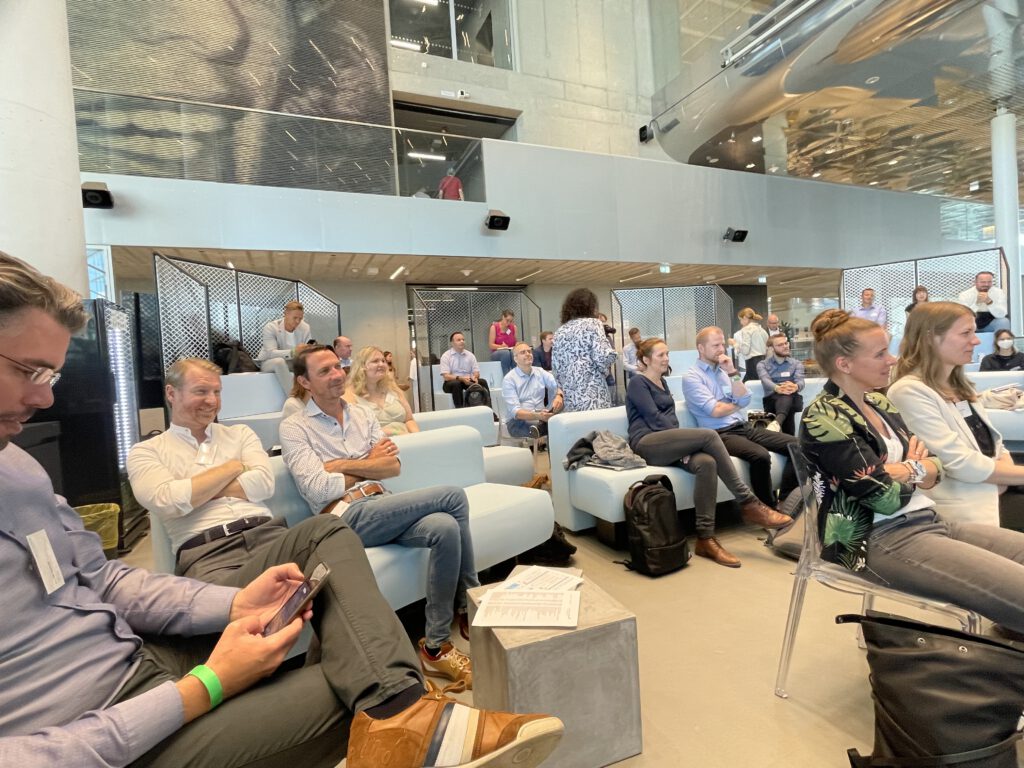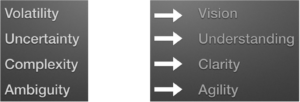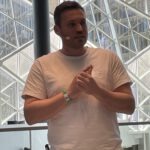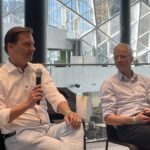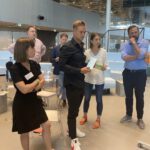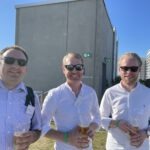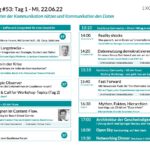Mit exzellentem Feedback im Gepäck (Statements der Teilnehmer folgen noch in einem weiteren Post) sagt das #ExcellenceForum (XF) nach zwei intensiven und vielfältigen Tagen Servus zu 44 Kommunikatoren aus 23 Unternehmen. Und wir sagen ganz herzlichen Dank unserem Gastgeber Axel Springer Corporate Solutions (ACSC) mit Christopher Brott. ASCS hat bleibenden Eindruck hinterlassen. Nicht nur mit grandioser Architektur und unschlagbaren Tagungsbedingungen, sondern auch mit Fachkompetenz zu vielen Themen rund um das große gemeinsame Ziel: datenunterstützte Kommunikation (DUK).
Gemeinsam geht es besser.
Die Praxis der einen liefert entscheidende Impulse für die Praxis der anderen. Konnte Fachtag#53 diese Grundidee des Excellence Forum umsetzen? Ja, meinte Dennis Klehr (Berliner Wasserbetriebe) im schnellsten Feedback auf LinkedIn: „Die spannenden Impulse im Rahmen der 53. Fachtagung des Excellence Forums um Michael Heine, Thomas Mickeleit und Frank Sielaff, … haben …mich inspiriert …, meine Arbeit als Kommunikator mit neuen Ideen und Ansätzen zu bereichern“. Geht es besser als so – gemeinsam?
Durch Daten wachsen Kommunikation und Marketing immer weiter zusammen, aber nie komplett.
Ein erstes Take-Away lieferte Christopher Brott gleich in seinem Eingangsvortrag. Er sprach über die Rolle von Content und Kommunikation für das von Marketern so genannte „Lead Nurturing“. Für Kommunikatoren entpuppte es sich als das systematische Pflegen und Ausbauen / Anreichern von Stakeholder-Beziehungen.
Beide Disziplinen, Kommunikation und Marketing, nutzen nur verschiedene Begrifflichkeiten, haben aber dasselbe Ziel mit ihren jeweiligen Anspruchsgruppen: Wertschöpfung durch Beziehungspflege, gemessen in „dem einen KPI, der zählt“ (OMTM: One Metric That Matters). Habt ihr einen OMTM je Anspruchsgruppe? Welcher ist es?
An welcher Stelle die Disziplinen dann doch divergieren müssen, zeigte Timo Barthelmes (B.Braun Aesculap) in seinem Parforce-Ritt quer durch alle Prozesse von Content bis zum Customer. Auf der Hälfte seines Marathons stellte er die gute alte AIDA–Pyramide von den Füßen auf den Kopf und zeigte, welche anderen Spielregeln gelten, wenn nach Identifikation des User das CRM greifen kann. Dann wird Kommunikation nach Geschäftspotenzial gesteuert – und wird sogar eingeschränkt, wenn keines erkennbar ist.
Daten helfen, zu relativieren. Daten helfen, zu beruhigen.
Daten…beruhigen?
Für „Data-Driven“, dessen hektisierende Zahlen viel zu oft in Sackgassen treiben, ist das ein völlig neues und sehr sinnvolles Paradigma. Formuliert hat es Kai Fetzer (Bosch) während der Präsentation des Bosch-Content-Flows von Kollege Michael Schmidtke, Head of Global Digital Comms.
Michael zeigte, mit welchen Instrumenten Bosch die Praxis von 2000 (!) Content-Erstellern erfolgreich koordiniert. Kann das auch gelingen, wenn man auf jeden negativen Peak reagiert? Keinesfalls. Was braucht man? Konstante Messung.
Bosch nutzt unser Content.One, um Themen-Peaks auf Ebene Output oder Outcome in Perspektive zu anderen Themen-Ergebnissen zu setzen. Wer konstant misst, kann erkennen, was möglicherweise unbedeutend ist.
Auf diese Methode, Relativierung und Einordnung, wies auch Benjamin Schütz, Social Media Lead bei RWE, hin. Er zeigte unter dem Titel „Datennutzung demokratisieren“ das eigene COM-Group Dashboard, das alles – Owned, Paid (Social) und Earned – erstmals vereint. Eben so, wie Content.One, es im Service-Dashboard des #ExcellenceForums auch tut.
Benjamin: Nein, es ist keine gute Idee, auf jede Kampagne von Aktivisten zu reagieren. Hat man Vergleichsdaten, kann man sehen, dass eigene Reaktionen die Reichweite negativer Inhalte nur vergrößern.
Kommunikation war schon immer VUCA. VUCA hat jetzt aber eine verschärfte Qualität.
Ein neuer Gedanke für alle Fortgeschrittenen auf dem Datenmarathon: Daten nicht als VUCA-Treiber betrachten, sondern als Beruhigungsmittel für den Umgang mit VUCA einsetzen.
Volatile, Uncertain, Complex, Uncertain – dieses militärische Führungskonzept des U.S. Army War College dominiert seit 10 Jahren auch den Strategie-Diskurs der Kommunikatoren. Haben wir angesichts eines akuten Krieges und vieler Dauerkrisen eine neue VUCA-Qualität? Das war die Eröffnungsfrage der Podiumsdiskussion von Co-Moderator Thomas Mickeleit mit Christof Hafkemeyer (EnBW) und Michael Schmidtke (Bosch).
Resümierende Antwort: Ja und Nein.
Nein, weil Unsicherheiten, Komplexität und Dilemmata schon immer zum Beruf des Kommunikators gehörten, meinte Christof. „Kommunikation war schon immer VUCA. Damit umzugehen macht Spaß, genau darum habe ich diesen Job gewählt“.
Ja, meinte Michael, denn das Sich-Überlagern von Dauerkrisen (Klima/Covid..) und Ukraine-Krieg erzeugt Anforderungen, die es in dieser Form vorher nicht gegeben hat. Wie damit umgehen? Mithilfe relativierender Daten. Und vielleicht, indem Kommunikation VUCA einmal anders buchstabiert…
Nichtstun ist keine Option: Datenunterstützte Kommunikation erfordert Kulturwandel.
Wie wichtig eine klare Vision ist, um den Datenmarathon zu meistern, zeigten zwei sehr wertvolle Beiträge aus der AG CommTech.
Richard Tigges (Audi) zeigte, als weit Fortgeschrittener, ein eindrucksvolles KOM-Dashboard, das tatsächlich Daten aus sämtlichen Arbeitsebenen zu einem voll transparenten Content-Loop integriert.
David Willmes (SCHOTT), am Beginn der langen Strecke, zeigte einen klaren Plan zur erfolgreichen Einbettung. Wie umfassend und alternativlos die Umbauarbeiten sind, die nötig sind, damit „Data Culture“ alle strategischen, operativen und organisatorischen Handlungsfelder des Datenmarathons unterstützt, zeigt dieses Chart von David sehr schön.
Wir wünschen allen Marathonläufern bestmöglichen Erfolg auf ihrer Wegstrecke!
Innovation durch Data Science. Das Excellence Forum macht den nächsten Schritt.
Zum Abschluss ein Meer faszinierender Möglichkeiten. #ExcellenceForum startet mithilfe avancierter Spracherkennung (nein, wir reden nicht der „künstlichen Intelligenz“ das Wort) die Themenerkennung aller Benchmarking-Teilnehmer.
Wozu avancierte Spracherkennung noch führen kann, zeigten Mark Heckmann und Stefan Heeke (Deutsche Bahn) zum Abschluss. Was sie als neues Instrument für Employer Branding vorstellten, war #mindblowing.
Live zeigten die beiden im letzten Vortrag zweier fantastischer Tage („der beste Fachtag aller Zeiten“ – so ein langjähriger Teilnehmer. Und hey, es sind nun dreiundfünfzig ) was passiert, wenn ungestützte Befragungsmethoden mithilfe Spracherkennung blinde Flecken erhellt – die kulturellen Dimensionen beliebiger Fragestellungen.
Wir werden diese faszinierende Methode im #ExcellenceForum nutzen, zuerst bei einem der kommenden monatlichen #WebCircles. Live, selbstverständlich 🙂
Und live geht es dann auch weiter. Beim Fachtag#54, am 10 und 11. November in Düsseldorf, bei Henkel.
Vielen Dank vorab an unsere kommende Gastgeberin: Bettina Fischer (Henkel)
Wir rocken das! 🙂
